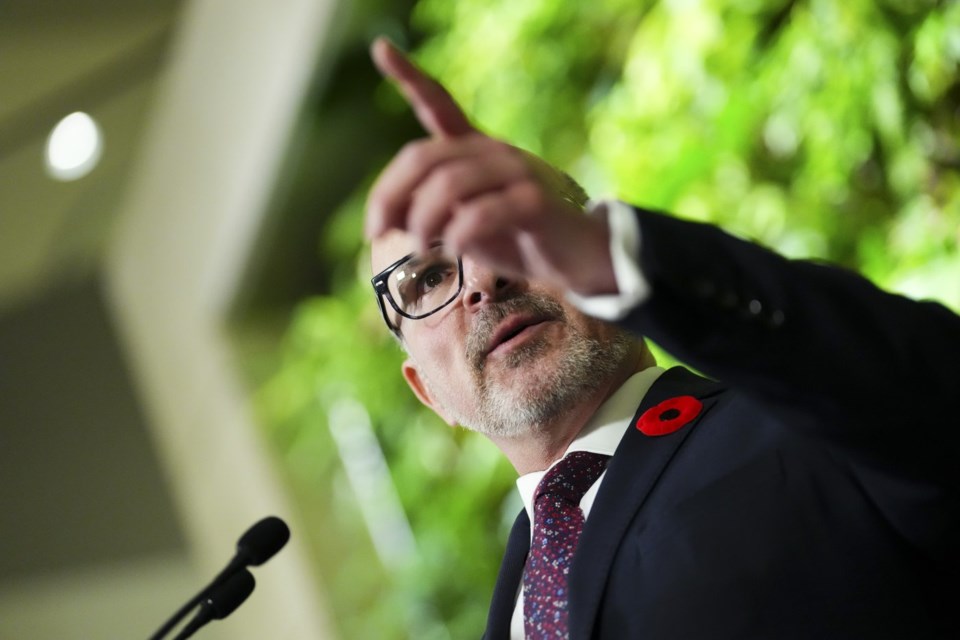OTTAWA — A Métis member of Parliament is calling on the employment minister to resign over what he calls harmful false claims to Indigenous ancestry.
Randy Boissonnault has been described as Indigenous multiple times in communications from the Liberal party.
In 2018 at a heritage committee meeting, he referred to himself as "non-status adopted Cree from Alberta," adding his great-grandmother was a "full-blooded Cree woman" — a statement he has repeated on other occasions.
He recently walked back those comments and said his family members belong to the Métis Nation of Alberta, after reporting by the National Post revealed that a company he co-owned had applied for government contracts while claiming to be Indigenous-owned.
The Opposition Conservatives focused their question period attacks on Boissonnault and his identity claims both Monday and Tuesday, demanding he be fired.
NDP MP Blake Desjarlais joined those calls Tuesday. Desjarlais, who is Métis, told reporters Tuesday that Indigenous people have been victimized by what has happened, and that people in Boissonnault's Edmonton Centre riding are "embarrassed."
"This race-shifting that's taking place is very concerning," Desjarlais said.
"If he does not resign, it's incumbent upon the prime minister to kick someone like that out."
Boissonnault's spokeswoman said he "remains focused on serving Edmontonians and all Canadians" when asked about the calls for him to step down on Tuesday.
Last week he apologized, saying, "I wasn't as clear as I could have been about who I am and my family's history," adding that he was learning about his family’s heritage "in real time."
The company Boissonnault founded before he was re-elected in 2021 has been under intense scrutiny for months. The Conservatives allege he continued working for the company while serving as a cabinet minister. Boissonnault has denied that.
Conservative MP Michael Barrett said last week Boissonnault should testify before the ethics committee on his claims to Indigenous identity so he can "answer truthfully for these serious allegations of fraud."
Prime Minister Justin Trudeau said earlier on Tuesday that Boissonnault has addressed questions about his identity, and that an "extremely important" part of reconciliation is empowering Indigenous communities and people to participate in the economy.
"The question of identity is an extremely delicate one for the federal government to weigh in on," he said.
"It is much more important that Indigenous communities themselves make determinations around the framework and the rules they have, and we will continue to work with them on those."
Indigenous Services Minister Patty Hajdu was pressed on the issue repeatedly at a House of Commons committee studying Indigenous procurement but would not say whether she thinks Boissonnault should remain in cabinet.
"I think you're saying a lot by not saying a lot, minister," said Conservative MP Garnett Genuis.
Desjarlais said Hajdu's non-answer on the subject makes it clear the government's intent is to try to "skirt this under the rug."
At the centre of the concerns raised about Boissonnault in recent weeks is the Liberal government's Indigenous businesses directory.
The current directory provides the federal government with names of businesses they could consider using to meet their Indigenous procurement target, which states a minimum five per cent of the total value of government contracts should be held by Indigenous-owned businesses. But some have complained there are businesses on the list that shouldn't be included.
Hajdu told the committee the company Boissonnault founded was not listed on that directory.
Shannin Metatawabin, the chief executive officer of the National Aboriginal Capital Corporations Association, spoke to the same committee in late October about what he called fraud that is "siphoning billions away from First Nations businesses that represent less than one per cent of the $22 billion the government spends on goods and services each year."
"The numbers are stark, and so is the impact. Fraudulent claims of procurement drain opportunities and hinder First Nations community growth, job creation and economic stability," Metatawabin told MPs.
He called for the Indigenous business list to be transferred to Indigenous organizations, including his own.
Hajdu has long said change is coming to the directory.
She said in June consultations are ongoing about which group should take over and monitor the list, and noted there is disagreement about who should be the "keeper" of the list and who should be on it.
Part of the issue is that national Indigenous organizations -- including the Assembly of First Nations, the Métis National Council and Inuit Tapiriit Kanatami -- are not always in agreement as to who is an Indigenous person.
The Assembly of First Nations, for example, has called for Canada to cease negotiations with the Métis Nation of Ontario on the basis they say the group represents people who are not legitimately Métis. The provincial organization has continuously defended its membership.
On Tuesday, Hajdu said there is still no consensus.
Northern Affairs Minister Dan Vandal, who is Métis, said Boissonnault has "always been an ally" to the Liberal Indigenous caucus and Indigenous members of the party. Other Liberal MPs who were asked questions by reporters agreed Boissonnault should stay in cabinet.
This report by The Canadian Press was first published Nov. 19, 2024.
Alessia Passafiume, The Canadian Press



